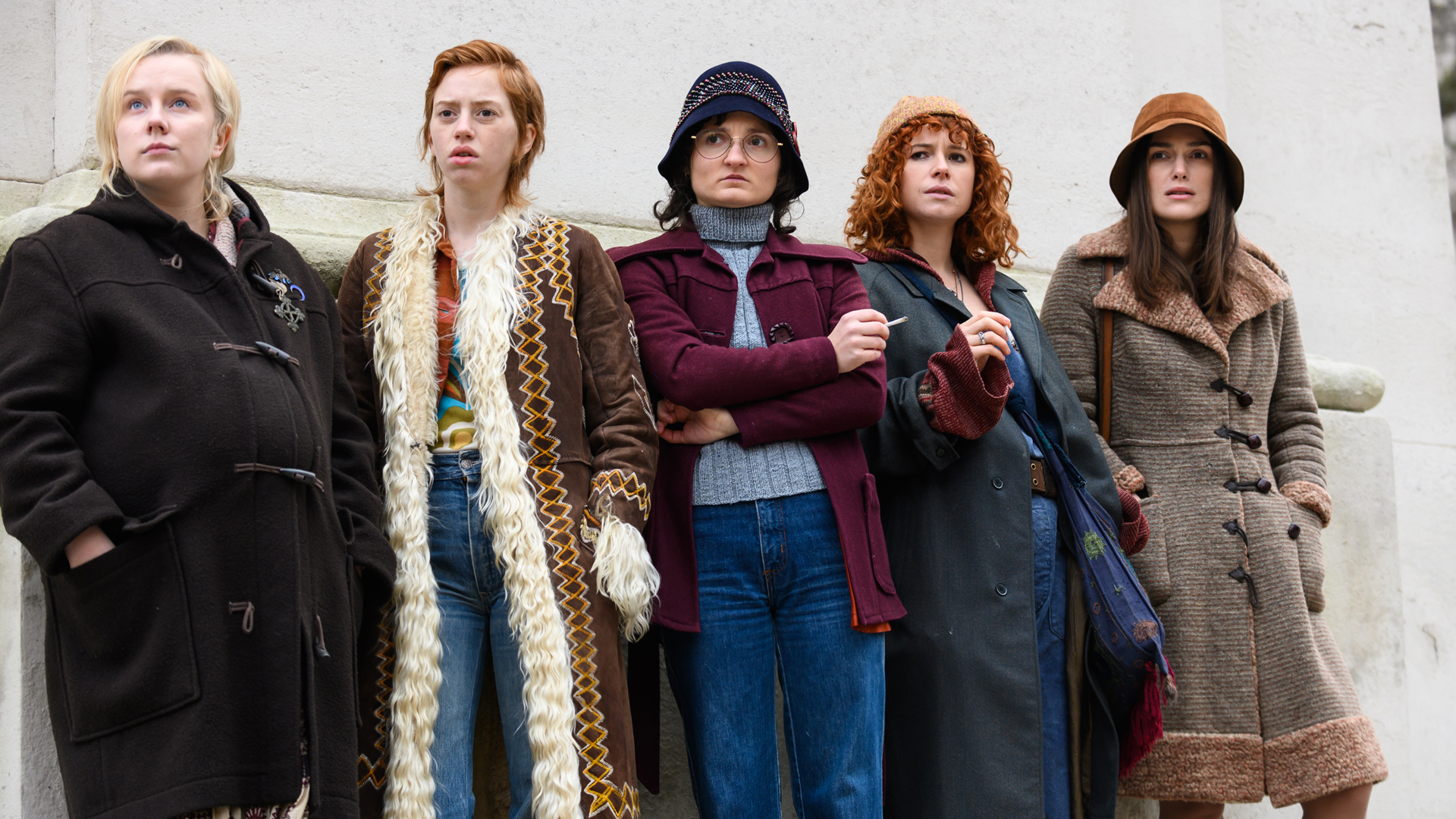What to Watch Verdict
It can’t help but feel like the women of these stories are themselves in competition for our attention.
Pros
- +
🥿Holistically educational about the dawn of the women's liberation movement.
- +
🥿A variety of intersectional perspectives on display.
Cons
- -
🥿Dramatized history isn't necessarily a story.
- -
🥿There's too many subplots to sufficiently flesh any out.
Do you remember how in school, on days where the teacher just needed a break from lecturing or a substitute was forced to fly without a lesson plan, they would roll in a TV and pop on a nominally educational film? It would usually be a biopic of some importance to the subjects the class was then studying, and the film would be essentially inspiring in the mold of a three-act screenplay, less messy than real life but no less dramatic for the actors’ performances. That’s basically the mold that Misbehaviour is working from. It tells the story of the 1970 Miss World contest and the protest that sparked the women’s liberation movement in the United Kingdom. It’s fine but it’s also missing some key facets that would make this a great film beyond its purely educational merits.
The main problem is that it wants to be the story of the entire Miss World contest, and in the process its subplots feel less like arcs that allow characters to grow and more like sketches that lead to a common destination. This is apparent even in the film’s most developed storyline, which follows Sally Alexander (Kiera Knightley) as she becomes disillusioned with the male-dominated university setting she is working to succeed within and instead joins up with an anarchist commune (prominently personified by the ever-excellent Jessie Buckley) with designs on disrupting the Miss World contest.
The film takes pains to show how, even in an academic setting, Ms. Alexander is judged for her appearance and for her failure to stay married — even as she’s raising a child — much like a contestant in a beauty pageant would be judged. However, there’s very little crisis of faith that radicalizes her further. The biggest points of resistance to her embrace of social disruption are her supportive, but safety-concerned partner (John Heffernan), and her stubborn traditional mother (Phyllis Logan). Their grievances are more philosophical than actual roadblocks as Sally’s story races toward inspirational inevitability.
There’s nothing inherently wrong with that, but it’s easy to start wondering whether more exploration of a central character would have yielded greater dramatic results, particularly as the film jumps between supporting characters to diminishing returns. For example, Gugu Mbatha-Raw stars as Jennifer Hosten, the contestant from Grenada who questions whether racism will ever allow her to do more than compete and whether she can actually win against the white beauty standards that predominate in the UK. There are some interesting philosophical counterarguments in her story that raise the importance of Black success as an example for future generations of girls to see and emulate, even if that success has to exist in the mode of a sexist judgment of their bodies and comportment. Her story feels shortchanged by having to exist parallel to the story of a number of white women who are presented as having a morally superior position.
The film becomes more crowded as an entire subplot is devoted to the sexism of comedian Bob Hope (Greg Kinnear) and the suffering of his wife Dolores (Lesley Manville). Bob Hope is primarily notable as the figure on-stage when the Miss World protests ignited, but he isn’t central to any other character’s plot, nor is he a terribly influential force on the film as a whole. He mostly exists to eat up time and to give Dolores a delicious moment of schadenfreude once he’s dragged into the chaos of protest.
Even more tertiary are the film’s attempts to address the racial controversy surrounding South African apartheid and South Africa’s yearly submission of a white contestant, sparking the entry of a last-minute Black contestant clumsily dubbed Miss Africa South (Pearl Jansen, played by Loreece Harrison). This is initially raised as a point of interesting intersectional politics, but it’s ultimately brushed aside in favor of plotlines dominated by more recognizable actors.
In isolation, each of these plotlines is serviceable, at least in theory and in what is presented for our consideration. Misbehaviour is competently directed by Phillipa Lowthorpe, who keeps the pace engaging even as the soundtrack falls into clichés like Aretha Franklin’s “Respect” and Giuseppe Verdi’s “Requiem, Dies Irae.” However, it also can’t help but feel like the women of these stories are themselves in competition for our attention, given little room to be more than historical icons. As fascinating as this snapshot of history may be, that’s missing the point a little.
The latest updates, reviews and unmissable series to watch and more!
Leigh Monson has been a professional film critic and writer for six years, with bylines at Birth.Movies.Death., SlashFilm and Polygon. Attorney by day, cinephile by night and delicious snack by mid-afternoon, Leigh loves queer cinema and deconstructing genre tropes. If you like insights into recent films and love stupid puns, you can follow them on Twitter.



